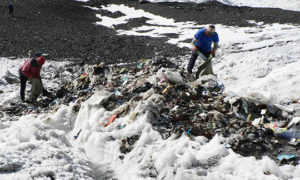Événement Conférence
International Mountain Day 2018 | Plastic in the Mountains

11 Dec 2018
10:00–12:00
Lieu: International Environment House I | Room 3
Organisation: Geneva Environment Network
A discussion on Plastic in the Mountains, took place on the occasion of the International Mountain Day, observed on 11 December, at the International Environment House.
About this Session
Every year, over 300 million tons of plastic are produced, half of which is used to design single-use items such as shopping bags, cups and straws. In recent years, the United Nations Environment Programme and the international community have been emphasizing their efforts to address the problem of plastics in our environment. A Global Partnership on Marine Litter was launched at the Rio+20 Conference in 2012, and various resolutions have been adopted at the UN Environment Assemblies in 2014, 2016 and 2017, on the challenges posed by marine plastic debris and microplastics, asking to address such materials at source. Governments, businesses and civil society organizations have been encouraged to make bold commitments to beat plastic pollution. Civil society is pushing for setting a new global convention with a multi-layered governance approach to address plastic pollution.
Occupying around 22 per cent of the planet’s land area, mountains play an essential role in supplying water, energy, food and other services to millions of people, and are a fragile ecosystem vulnerable to pollution. Recognizing the importance of pursuing sustainable mountain development, countries adopted mountain-related targets under the 2030 Agenda for Sustainable Development and its 17 Goals and targets (6.6, 15.1 and 15.4) and made a space for concrete efforts to protect mountain ecosystems.
The Waste Management Outlook for Mountain Regions, produced by UN Environment and its partners in 2016, provides an introduction to the pollution issues in the mountains. Increasing tourism, agriculture, urban expansion, mining, consumption patterns, and practices of illegal dumping are polluting mountain environments. Furthermore, decomposition rates in the high mountains are much slower than in low-lying environments.
This event, organized within the framework of the Geneva Environment Network, provided a platform to discuss how the international and local communities are addressing the problem of plastic pollution, with a particular focus on mountain areas. The summary report is available online.
Agenda
10:00
Welcome and Introduction
Diana RIZZOLIO, Coordinator, Geneva Environment Network/UN Environment
Lesya NIKOLAYEVA, UN Environment
10:15
Waste Management Outlook for Mountain Regions: Plastic Pollution and Downstream Impacts
Carolina ADLER, International Climbing and Mountaineering Federation, and Mountain Research Initiative (Swiss Academies of Sciences)
Followed by questions and comments
10:35
The International Community Beating Plastic Pollution: Looking Upstream
Carlos MARTIN-NOVELLA, Deputy Executive Secretary, Basel, Rotterdam and Stockholm Conventions
João SOUSA, Senior Programme Officer, Marine Plastics, IUCN
Followed by questions and comments
10:55
The Role of the Tourism Sector
Zoritsa UROSEVIC, Geneva Representative, UN World Tourism Organization
Followed by questions and comments
11:15
Cleaning-up Programmes and Activities
Olivier KRESSMANN, Project Manager, Summit Foundation
Johannah BERNSTEIN, International Environmental Lawyer
Alex LESHCHYNSKYY, Section Diablerets, Club Alpin Suisse
Followed by questions and comments
Documents
- Invitation
- Waste Management Outlook for Mountain Regions
- Presentation by Lesya NIKOLAYEVA
- Presentation by Carolina ADLER
- Presentation by Carlos MARTIN-NOVELLA
- Presentation by João SOUSA
- Presentation by Zoritsa UROSEVIC
- Presentation by Olivier KRESSMANN
- Presentation by Johannah BERNSTEIN
- Presentation by Alex LESHCHYNSKYY
- Summary – Plastic in the Mountains
Video
The event was live on Facebook. (part 1, part 2)
Photos
Photos of the event are available on BRS MEAS Flick account.
